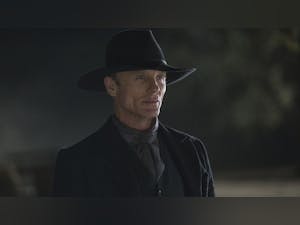From: The Scene Blog
Movie Review: Emily Blunt carries the best-seller turned film “The Girl on a Train”
Author Paula Hawkins capitalized on her 2015 best-selling thriller novel The Girl on the Train (2015), by following in the footsteps of the movie Gone Girl, which also features a “missing woman, unhinged protagonist” plot, and was adapted to the big screen fairly quickly after its initial print release. Directed by Tate Taylor and starring the exceptional and industrious Emily Blunt, the movie stays largely faithful to the book, weaving together a dramatic tapestry of sex, lies and murder.
The story follows Rachel (Emily Blunt), an unemployed alcoholic who spends her days taking the train to and from New York City, drinking away perceived failures from her last marriage. She becomes obsessed with a beautiful, romantic couple who she sees enjoying eachother’s company in their front lawn. Obsession turns quickly to full on stalking, and it is soon revealed that the woman she watches (Haley Bennett), was employed by Rachel’s ex husband. The woman eventually goes missing, and much of the movie revolves around Rachel’s desire to solve the disappearance. While the driving motives of the characters are never questionable, the sheer amount of warning signs conveying trouble is enough to make anyone shake their head in frustration.
By piecing together the mystery, Rachel is also able to put her alcohol-addled memory back together, ultimately revealing the twist of the movie. Blunt’s acting is stellar throughout, making the character of Rachel seem both utterly broken and deeply sympathetic, without crossing the line of melodrama. You can see the pain and confusion in her eyes from the start and the level of emotion that Blunt brings is captivating, even if you want to look away.
The movie is a story about “the other woman” if nothing else. All three of the women in the movie have had relations with a psychotic and controlling lover, Scott (Justin Theroux), making the case that old-fashioned dating paradigm of looking for love close to home might be more trouble than it’s worth. The climax, which features two of the women teaming up for a bloody revenge, is simply too neatly wrapped and soap-opera esque. The tension and suspense that is built up in the first half is failed by the largely predictable, safer second half.
Both the acting and the character decisions of some of the minor roles, like Detective Riley (Allison Janney) and Anna (Rebecca Ferguson), feel out of place and awkward. The detective is a little too casual with how she deals with the clearly volatile and unhinged Rachel. Instead of seriously questioning her, the police decide it’s best to allow her to continue stalking and meeting with other suspects, rather than to detain her. The fact that Rachel’s sister Cathy (Laura Prepon) didn’t catch on to the fact that Rachel was unemployed is simply not believable and serves as a reminder that every character is just enabling Rachel’s behaviors. When Rachel was covered in blood and bruises, why did Cathy not think to get professional help for her sister? Plot holes such as these make what could be a sharp thriller feel like more of a straight-to-TV melodrama of a movie.
There are times where the dialogue sounds like it was simply dragged from the prose of the book and dropped into the movie, sounding overly poetic and unlike anything a real human, especially one under such intense stress, would say. The use of the unreliable narrator is a staple for many of the best thrillers, and proves to be the most intriguing part of this movie too. However, the irony in having an alcoholic kill her attacker with a corkscrew in a house that is blue (to show sadness), while just about everything that Rachel looks at is blue, is a bit much.
The repetition of mind games, fertility and loneliness is something that draws more from a more recent season of American Horror Story (not good) than Psycho. While the moment of girl-power at the end is nice, the message that is conveyed by the ending is that it is ok to stalk someone if your intentions are justifiable in your own head.
Danny Elfman’s score is unnerving and beautiful, and the camerawork throughout is artfully done and eloquent. What’s really missing is a reason to believe that any of the events could take place in the real world of Hudson, NY that the setting exists in. The warning signs for abuse, cheating and obsession are blatantly obvious, and a thoughtful, self-aware character could have ended the whole matter in no time. Plot gripes aside, the psychological element of this movie, brought home by Emily Blunt, makes this a must-see for readers of the book and for those looking to watch a gorgeous thriller take a well-paced ride.
Grade: C (for cheating)




